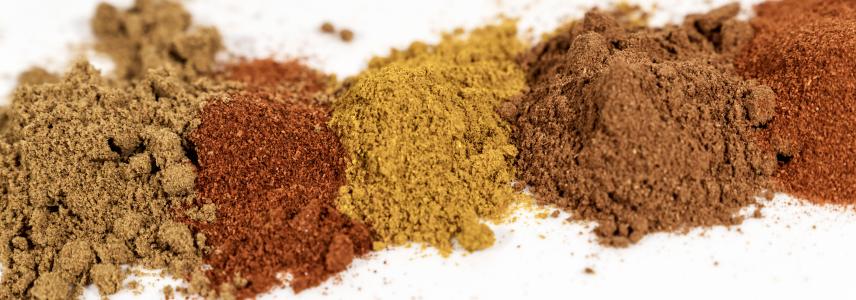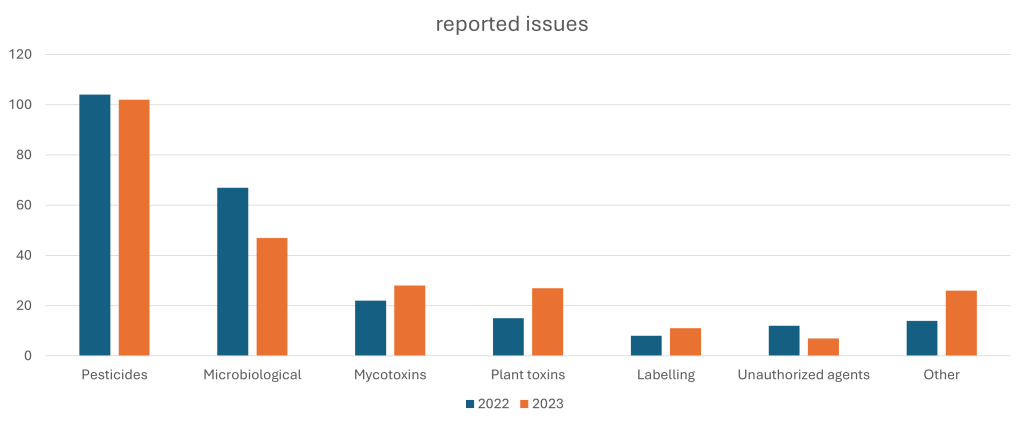Pesticides are still the main reason for the rejection of spices and herbs

Although the number of reported pesticide issues slightly decreased in 2023, it remains high. In 2023, the European Commission reported 248 problems with spices and herbs, a slight increase from 2022. Pesticides remained the most common issue, followed by salmonella.
The number of pesticide issues is still high
The Rapid Alert System for Food and Feed (RASFF) reports non-compliance with European food legislation. The problem divisions for spices, herbs and spice mixes are as follows:
- 42% pesticides;
- 19% microbiological issues;
- 12 % mycotoxins; and
- 11% plant toxins (11%).
Figure 1: Number of reported issues for spices, herbs and spice mixes in RASFF by category

The top 3 used pesticides
- 25% of all pesticide issues relate to Ethylene Oxide (EtO), a colourless gas banned in the European Union (EU). Exporters to the European market must treat spices with alternative methods or fumigation agents. Heat treatment, for example, can reduce the risk of insect contamination.
- The insecticide Chlorpyrifos is the second most common pesticide, and the EU banned it in early 2020.
- Third is the 'cocktail' category (21% of the total), which refers to all pesticide blends of at least 2 different types.
Plant toxins in the European Union
Since December 2020, there have been rules on how much pyrrolizidine alkaloids (plant toxins) the EU allows in certain food products:
- For most dried herbs and cumin seeds, the limit is 400 micrograms per kilogram.
- For (mixes of) borage, lovage, marjoram, and oregano, the limit is higher at 1,000 micrograms per kilogram.
Cumin exports from Turkey to Europe face challenges in particular. The reported issues grew from 8 in 2022 to 13 in 2023, causing an 80% growth in 1 year.
The big 5: India, Brazil, Turkey, Egypt and Indonesia
A deep dive into the RASFF database shows that 5 countries contribute substantially to the total number of issues.
- India contributed with 58 issues in 2023, up from 53 in 2022. Almost 80% of these cases involved exceeding the maximum residue levels (MRLs) for pesticides.
- Turkey had 38 issues in 2023, up from 17 in 2022. Most reports are about problems with:
1. Plant toxins (cumin);
2. Pesticides;
3. Mycotoxins; and
4. Salmonella. - Brazil has a reputation for salmonella-contaminated black pepper. Black pepper production in Brazil often takes place on small family farms, where farmers dry pepper in the open air. Open-air drying has a high risk of salmonella contamination from animals and birds. The number of salmonella issues went down drastically from 45 in 2022 to 20 in 2023. But, this was mostly due to a 36% lower export volume to Germany, which has always been the leading country reporting these issues in RASFF.
- Egypt and Indonesia are very close in terms of issues reported in RASFF. They both had 10 issues in 2022 and rose to 18 and 16 in 2023. Indonesia's issues mainly concern the mycotoxin contamination of nutmeg. Egyptian exports to Europe mostly face issues with pesticides and salmonella.
Learn more
In the CBI study, What requirements must spices and herbs meet to be allowed on the European market, you can learn more about MRLs and how to prevent contamination. For product-specific insights, you can read CBI's product studies.
Globally Cool wrote this news article for CBI.
Stay informed
To stay informed on the latest developments in the spices and herbs sector, subscribe to our newsletter.